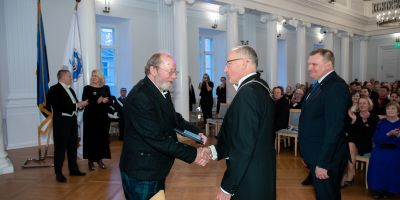Baldwin of Bourcq, Count of Edessa and King of Jerusalem (1100-1131): Dr Alan V. Murray on his new book

The book has been published by Routledge as part of their Rulers of the Latin East series.
Senior Lecturer and specialist in Medieval Studies at the School of History, Dr Alan V. Murray, has a newly released book: Baldwin of Bourcq: Count of Edessa and King of Jerusalem (1100-1131), published by Routledge, 2021. It is the first ever biography of a man who rose from obscurity to become one of only a dozen kings in twelfth-century Christendom.
The book tells the story of the life of a crusader, who joined the expedition summoned by Pope Urban II to liberate the holy sites and Christian populations of Syria and Palestine from Muslim rule.
Baldwin of Bourcq explains the complex and shifting geopolitics of the principalities established by the First Crusade and the Muslim territories around them, along with Baldwin’s character as a ruler and leader in war, the significance of his wide-ranging kinship network, and the succession to the kingdom of Jerusalem.
Why did you choose Baldwin of Bourcq as a subject for your biography?
Baldwin had a meteoric career. We know nothing about him before he joined the First Crusade; he was essentially a nobody. Yet shortly after the crusaders captured the city of Jerusalem in 1099, this minor nobleman was installed as count of Edessa, a vast swathe of territory covering much of what is now south-eastern Turkey, ruling over a mixed population of Armenians, Syrians and immigrant Europeans. Then in 1118, he was called to become King of Jerusalem on the death of its ruler. He established a dynasty, and his descendants ruled the Holy Land for over a century.
What most surprised you in your research into Baldwin’s life?
When I plotted the course of Baldwin’s life I was staggered at how much time he spent on campaign. As ruler of two principalities in turn he was responsible for their defence against hostile Muslim powers, but he was also obliged to take on the regency of a third, the principality of Antioch, after its prince was killed in battle. Baldwin was continually in the saddle, and on campaign up to the last year of his life.
Your research is rooted in the study of networks. Did you find any mysteries in the documentary record, and were you able to resolve these?
Most of the Latin sources state that Baldwin was a kinsman of his predecessor as king of Jerusalem, but never exactly specify how the two were related. I was hoping to figure out the precise connection between the two men. In the end, I had to conclude that even at the time no one was exactly clear about it: the idea of kinship seems to have been put forward by Baldwin’s supporters in 1118 as an additional argument as to why he should be given the throne in preference to a rival claimant. But his family network was crucial. He relied on a significant number of his cousins from France who he appointed to key positions in government and the church. It was this loyal support that prevented an attempt to dethrone him by a discontented faction among the nobles of Jerusalem while he was a prisoner of the Turks in 1123.
How do the contemporary sources portray Baldwin’s character?
Contemporaries were impressed by his piety, his bravery, and his horsemanship. Some of the Latin sources give hints of criticism that he neglected the kingdom of Jerusalem by spending so much time defending the other Christian principalities. But both Christian and Muslim sources recognise that he was a bold and wily commander. My favourite judgement is the one given by Ibn al-Qalānisī, an Arab writer, who shows grudging respect: “On many occasions, he fell into the hands of the Muslims as a prisoner, in times both of war and of peace, but he always escaped from them through his famous devices and historic stratagems”.
If you could travel back in time, what episode in Baldwin’s life would you most like to observe?
I am fascinated by how someone who grew up in northern France adapted to become ruler of a completely different cultural environment in the Middle East. After becoming count of Edessa, Baldwin married an Armenian wife in a political alliance. When they first met she spoke Armenian and some Greek; he only spoke French. I would dearly love to know how the two got on in the early days of their marriage. But I’d also want to observe another episode. As a young man, Baldwin was taken prisoner by the Turks, and he was captured again in middle age. I would like to know how he found the resilience to survive two lengthy periods of captivity and emerge from both to resume his responsibilities as ruler – as long as I didn’t have to share the conditions of his imprisonment!
Baldwin of Bourcq received the 2022 Verbruggen Prize awarded by De Re Militari: The Society for Medieval Military History.
Find out more about Baldwin of Bourcq: Count of Edessa and King of Jerusalem (1100–1131)




